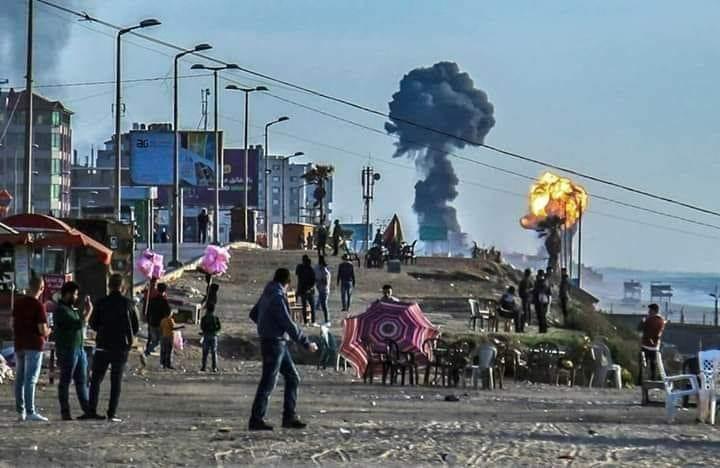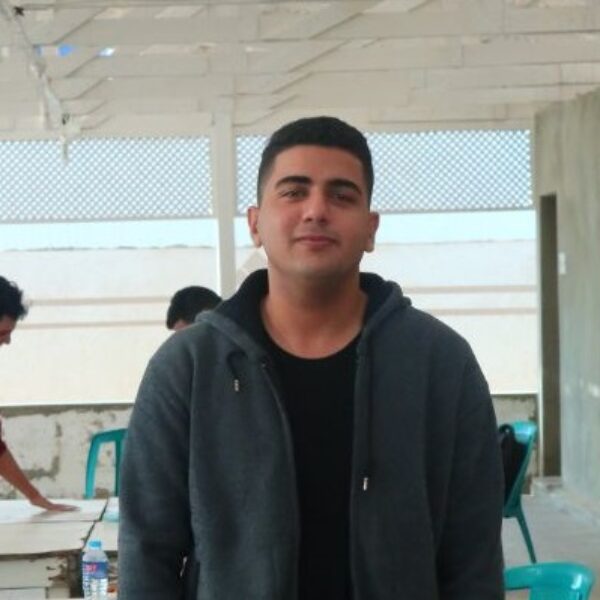
Driving to the sea with my brother Mohammed, I was reflecting on the gray buildings and the green areas in my city under the crystal blue sky. Rafah, where I was born and live happily with my family, rests on the edge of the Mediterranean Sea. It is a small city of 200,000 located in the south of the Gaza Strip and home to the Rafah Crossing Terminal. This crossing remains the only gateway to Egypt and other countries, following the tight blockade imposed on the Gaza Strip in 2007.
Every Friday families visit the beach for respite from a long, tiring week. The sea offers the only refuge from the daily sufferings of the people of Gaza. It is a place to relax with children and exchange stories of hardships, aspirations, and dreams.
However, the Friday of August 5, 2022, was a completely different kind of Friday. While my brother and I were playing football on the tranquil sand, we were startled by deafening explosions and hazy-thick smoke coming from different parts of the city. At that moment, we wanted to deny what our eyes and ears were telling us, but instinct drove us to reach for our cell phones to check the news. Israel had officially declared war on Gaza.
The calm disappeared as air raids and bombardments broke out all over Gaza. The sky was swarming with jet fighters and reconnaissance planes. Every phone was busy checking on loved ones, and people scattered. We scattered too, fleeing the beach to grab a taxi home as the security condition deteriorated.
Like everyone else, when I arrived home to my parent’s anxious faces, I quickly switched on the radio to hear the heartrending news of the killing of 10 people, including a 5-year-old child and a 23-year-old woman. Fears grew as the news worsened, and the number of casualties and injuries rose. In turn, people flocked to supermarkets and local shops to stock up on essential items, not knowing how long this new round of war would last.
The news of this latest Israeli aggression re-opened bitter memories of last year’s war on Gaza. On May 10, 2021, Israel launched a vicious 11-day attack on our small coastal enclave without any humanitarian thought for the lives of thousands of Palestinians trapped in a mere 365 square kilometers of land (141 sq. miles). It was a month of death, injuries, and destruction.
I recall the devastating attack on our neighbor’s house, where many were killed. Those dead men, woman, and children had been our friends, our neighbors, and our companions in resistance and suffering. Our home, which is adjacent to the bombed house, was ravaged in the bombardment. My mother and 14-year-old sister were injured from the shrapnel and broken windows, and we were all psychologically shattered as the bombardment took place without warning while the family was enjoying lunch.
The 2022 aggression came less than 14 months later, with the wounds of the last war not yet healed. As the attacks entered their third day, the number of martyrs burgeoned to 24. Most were civilians including small children slaughtered while playing in the streets. The American-made rockets used by the Israeli army are indiscriminate in their targets, so scenes of children being rescued from under the debris of their houses became a familiar sight. There was a constant stream of anxious people rushing to hospitals to check on their loved ones. Those not injured were psychologically traumatized, and all will carry the scars of war for the rest of their lives.
Palestinians have experienced five wars in the last 12 years, not including other attacks from Israel, such as the one in 2019 pictured above. As the international community is not doing enough to stop Israeli massacres of our communities, and with Israel enjoying impunity from their crimes, Gaza has become a deadly place to live. With the economic situation in decline after the crippling siege that has lasted more than 15 years, many citizens dream of leaving for a safer place, a haven where they and their children can live without fear.










